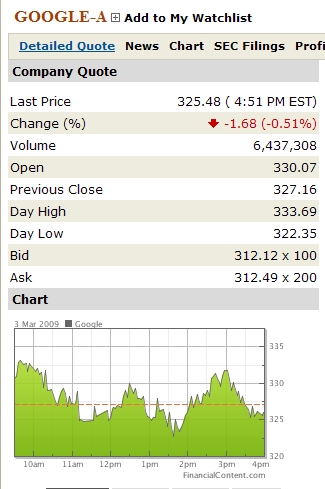Google CEO Schmidt: China 'obvious prize,' Twitter 'poor man's e-mail system'

 Google CEO Eric Schmidt just finished up his Q&A at the Morgan Stanley Technology Conference with some choice words.
Google CEO Eric Schmidt just finished up his Q&A at the Morgan Stanley Technology Conference with some choice words.
First, about overseas opportunity:
"The obvious prize would be China, because of the simple volume there."
Second, about everyone's favorite microblogging service Twitter:
"Speaking as a computer scientist, I view all of these as sort of poor man's e-mail systems," adding that "Twitter's success is wonderful and it shows you that there are many, many ways to communicate" and name-dropping Google's new account.
Schmidt also noted that the search market is "not settled at all," and that subsidized Netbooks were a likely business model in the future.
Other than those gems, Schmidt had kind words for Yahoo's CEO Carol Bartz and nastier ones for Microsoft CEO Steve Ballmer and Co.:
"We did our best attempt with a deal with Yahoo," adding that he wishes them well, and that "Carol is a fine and able CEO."
As for future hurdles, Schmidt said that "The problem has to do with Microsoft's ability to use its Windows monopoly to restrict consumers' choice," adding that anything Microsoft would do to limit choice -- for which it was previously found guilty, he noted -- is "of concern."
He also spoke about Google's lucrative advertising business:
"The future of display ads is not a static picture but one that brings you in," explaining that Flash or video ads are more engaging, especially when they have a "story" or "narrative."
Schmidt also noted that Google is working on longer-form, HD content on YouTube, and that revenue for the popular video service is "taking much longer" than the company had hoped.
Most of the conversation had a distinctly economic tack, and Schmidt spoke frankly about the downturn, the stimulus bill and Google's place in all of it:
"We benefit when our customers buy stuff," noting that Google's customers are middle class. As for the stimulus package, "It's more a question of how the Internet benefits from it."
Schmidt said 2009 would be a "tough, tough" year, with global struggles that "will translate to our world," meaning that Google was "not immune" to the worsening economy. It won't be until 2010 until we start seeing economic recovery, he said.
He also tagged on some global thoughts on the U.S. market: "Americans love their credit cards," and "the American story is the story of innovation."
Schmidt noted that the venture capital game is one of waiting, due to unfavorable prices, but that "the good news is we have lots of capital."
Earlier today, the company revealed 2008 executive bonuses totaling some $6.3 million. Google late-traded shares fell 3 percent to $315.57.
